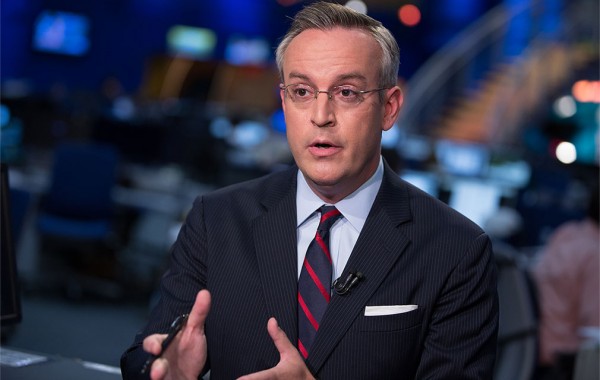
Eamon Javers ’94
Hearing Eamon Javers ’94 talk about Russian oligarchs and double agents sounds like the makings of a spy novel, but his stories are fact, not fiction.
As he’s learned in his 20 years as a journalist, one tip leads to another, and another, uncovering potential for new stories. That’s how Javers got mixed up with a “fascinating lineup where you had American CIA veterans and British MI5 veterans working for a Washington lobbying firm that was working for a Russian oligarch,” he said.
While a reporter for BusinessWeek in 2006, Javers learned of a lawsuit, filed by the global accounting firm KPMG, against the Washington-based, private intelligence firm Diligence. KPMG alleged that Diligence used subterfuge to obtain KPMG documents that were crucial to an ongoing battle between two powerful Russians. The story unfolded to reveal details of ex–British intelligence agents working for the Russians, documents in Tupperware containers buried in Bermuda, and billions of dollars at stake.
As he was writing the story, Javers “discovered that there’s a whole industry of private spy firms” and thought, “That’s a book.” To have time for investigating, he switched over to a part-time position at Politico. “I had to find the people involved and convince as many of them as I could to talk to me,” Javers said. For two years, he delved into the world of private spy firms doing the dirty work for corporations. In 2010, he published Broker, Trader, Lawyer, Spy: The Secret World of Corporate Espionage (HarperBusiness).
One ironic result of working on the book was that Javers picked up techniques that help him as a reporter. Research on a spy firm founded by ex-CIA officers gave him pointers on using body language interpretation to assess if someone is lying. Also, he’s learned how to get sources to confide in him through “elicitation” — a way that CIA agents draw out more information than people had planned on telling. “You have to be sympathetic and encouraging, and suspend your moral judgments while you’re gathering the information,” Javers explained. “You have to deal with a lot of shady characters, and you can’t let them feel that you’re judging them.”
At times, mingling with those shady characters has put Javers at risk. While working on the book, he received a call from a veteran U.S. government official who said: “You’d better cancel your trip to Moscow. We can’t protect you over there.”
He’s also been threatened with lawsuits, but “fortunately, I live in a country where we have freedom of press and the ability to write things that are true, even if those things are embarrassing to powerful and wealthy people.”
Jack Abramoff, the former lobbyist convicted of corruption, is one example. As the story of Abramoff’s lobbying scandal was exploding in the press, Javers dug up new information and wrote about Abramoff paying off columnists with envelopes full of cash.
Having joined CNBC in 2010, Javers now specializes in the intersection of Wall Street and Washington, focusing on topics like high-frequency trading and cybersecurity. But he’s also still had the opportunity to chase down stories of international intrigue.
One tip took him to Dubai, where a source was willing to talk about the disappearance of billions of dollars in cash sent from the New York Federal Reserve to Baghdad during the Iraq War. “He ended up telling incredible stories of what happened with the money” that the U.S. government was sending over to help finance the new Iraq government, Javers explained. The CNBC documentary, The Baghdad Job, about “one of the greatest financial mysteries of all time,” aired in 2011.
With all that Javers has seen and heard, one might think he’d be a paranoid and cynical person. But the father of three said that he’s able to leave work behind and enjoy his family. It helps that “I love this stuff,” said Javers, who also is a regular panelist on PBS’s Washington Week with Gwen Ifill. “I love meeting the characters and understanding how they operate and why.
“I’ve found that more often than not it’s human incompetence that’s behind these situations and not malicious, scheming people. [I have] run into genuine bad guys who are doing things that are designed to corrupt systems,” he added, “but in a small way, I think journalism helps to police that.”
— Aleta Mayne






